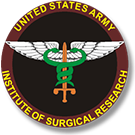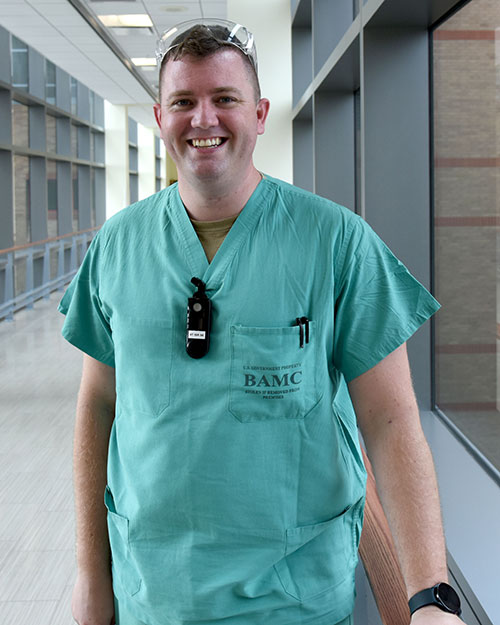Behavioral Health Specialist Beneficial for Some Burn Center Patients
The multidisciplinary burn team at U.S. Army Institute of Surgical Research (ISR) Burn Center at Joint Base San Antonio-Fort Sam Houston, Texas, cares for the sickest of the sick [high acuity] patients within the Department of Defense. And as the regional burn center in South Central Texas, they also care for high acuity civilian patients. Some patients with traumatic burn injuries or other life-altering sickness or diseases have a difficult time adjusting with the healing process or dealing with the rehabilitating progression to live with their new normal.
That's when Sgt. Ronald C. Smith, an Army Behavioral Health Specialist, reviews the records of every patient admitted to the Burn Center; an effort then followed by a behavioral health triage that includes an anxiety and depression screening.
"Under the supervision of an occupational therapist, we conduct initial interviews, triage, risk assessments, client assessments, mental status examinations, develop and implement treatment plans, group facilitation, collect and record psychosocial and physiological data, and other instruments that assess the client's potential or actual response to treatment and/or rehabilitation" said Smith. "Here at the ISR I find that we engage with patients who suffer from anxiety and depression the most."
Chuck Quick, an occupational therapist at the Burn Center, supervises Smith's clinical duties on a regular basis and says that the patient's assessment is critical to a treatment plan that optimizes the healing and recovery process.
"The information gathered is used to assess educational and therapeutic needs designed to support the holistic recovery from their trauma or illness, be it injury or infection," said Quick. "Following staffing of the clinical findings the behavioral health treatment plan is developed according to patient needs, goals and findings. Using a variety of engaging therapeutic interventions that informs the patient of the knowledge of clinical findings the behavioral health technician transitions the intervention from education to development of skills the patient can practice and use to support improved mental health and enhanced physiological environment for recovery."
Quick also added that a high percentage of burn patients arrive with comorbidities of mental health diagnoses consisting of depression, anxiety and/or substance abuse disorders.
"Understanding that many patients suffer from anxiety and depression prior to the burn trauma itself establishes a need to be well-versed in diagnosis specific interventions," he said.
Smith said that as a behavioral health specialist he is able to intervene with Burn Center patients and help them build the skills needed to best push through the difficult phase in their lives.
"I have also found that we instruct our patients on prevention of what is called Acute Stress Disorder and PTSD [Post Traumatic Stress Disorder]," said Smith. "By teaching our patients how to identify acute stress disorder and how to reduce the symptoms they are more equipped to deal with it as it comes."
Smith is one of two behavioral health specialists at the Burn Center and said that he chose this particular field because he loves to help people, especially when he sees their struggle with anxiety, depression or other psychological disorders.
"I love to see someone able to reduce their anxiety and depressive symptoms themselves," he said. "It may sound funny wording it that way, but as I see people apply the techniques and skills that I teach them, it is rewarding to see as they begin the road to recovery."
Quick points out that behavioral health technicians like Smith are an essential part of the Burn Team as they are trained in addressing precipitating psychological experiences.
"Their expertise supports the functional recovery of our patient population by connecting their psycho-social findings with occupational therapy's identified functional deficits," said Quick. "This arrangement ensures the development of holistic interventions to remediate skills according to the underlying cause and reconnect patients to their identity and overall life purpose."
Smith admits that working with burn patients is not always easy, especially those who don't put effort into their own recovery.
"One's overall mental health and recovery therein, is all up to the individual," said Smith. "For the skills that I teach someone to truly help a patient, they have to accept a need to change and want to make that change. This means changing thought patterns, or putting an effort for adjusting their sleep. Being able to help an individual learn the need for change is by far the hardest part even more so when the individual refuses to see the need."
But that hasn't discouraged Smith from putting his best effort into helping each patient he works with.
"I believe as we all work to improve ourselves, and when we try to better those around us, we all can learn things that will better our lives," he added. "Emotions, feelings and what we care about are all things that we should never shun or ignore. Working in the Burn Center has taught me that a little bit of patience and persistence can go a long way."
 An official website of the United States government
An official website of the United States government
 ) or https:// means you've safely connected to the .mil website. Share sensitive information only on official, secure websites.
) or https:// means you've safely connected to the .mil website. Share sensitive information only on official, secure websites.

